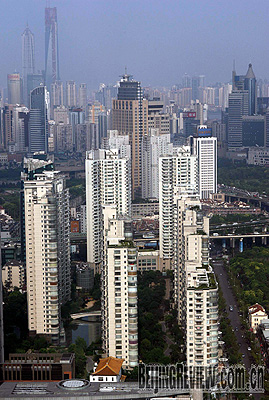|

PRICEY PROPERTY: International hot money is considered an important driver of the Chinese real estate market in major cities (ZHANG MING)
Hot money can cause serious problems for a country's financial stability. Though analysts have controversial opinions about how hot money winds its way into China, most of them acknowledge that fast inflows and outflows of hot money have become an issue to be reckoned with. Their influences have been felt in capital and property markets as well as the overall macro-economic performance. Earlier this month, Economic Information Daily published an article about how the government tracks hot money flows and supervises them. Excerpts follow.
How much?
The latest statistics indicate that in the first quarter the country's foreign exchange reserves stood at $153.9 billion, while the aggregate value of the trade surplus and paid-in foreign direct investment (FDI) for the same quarter was approximately $70 billion. Many analysts conclude that the difference between the foreign reserves and the above-mentioned aggregate amount is the scale of international hot money in the first quarter.
But Zhao Qingming, a senior research manager at China Construction Bank, said the amount of hot money simply could not be determined in such a way. Zhao said the appreciation of non-U.S. dollar assets in China's foreign reserves contributed to the fast growth of its foreign reserve value.
Mei Xinyu, a researcher at the Chinese Academy of International Trade and Economic Cooperation under the Ministry of Commerce, agrees that the amount of hot money is not that large. The continuous devaluation of the U.S. dollar has increased China's non-U.S. dollar reserves, he said. The income from investing foreign reserve money as well as the settlement of domestic companies' foreign exchange swaps also have contributed greatly to the increase in the country's foreign reserves, he said.
Why China?
Why does international hot money favor China? Li Yang, a financial researcher at the Chinese Academy of Social Sciences (CASS), said the interest rate gap between the United States and China and the foreign exchange arbitrage brought about by renminbi appreciation both have triggered a greater influx of international speculative money.
Li believes that simple speculation such as interest rate arbitrage and foreign exchange arbitrage could bring speculators profits of more than 10 percent.
The surge of international hot money has been caused in part by U.S. interest rate cuts in the wake of the subprime mortgage crisis. The U.S. Federal Reserve has cut its key federal funds rate seven times since last September from 5.25 percent to the current 2 percent. In the meantime, the Chinese central bank started its sixth round of interest rate hikes since last year. At present, the benchmark one-year deposit interest rate was raised to 4.14 percent from the previous 2.52 percent. The opposite action of the two nations has further lured the influx of the overseas speculative money, Li said.
The continuous devaluation of the U.S. dollar has forced hot money to find a way out, with emerging markets becoming its destination. Some of the hot money holders were tempted by the fast appreciation of the Chinese currency. In the first quarter, the renminbi rose more than 4 percent against the U.S. dollar, the fastest quarterly appreciation since the currency reform of 2005.
Zhang Ming, a financial expert at CASS, said he believes the robust growth of the mainland property and capital markets was another important reason for the huge inflow of hot money.
How did it enter?
Zhang said hot money has entered China through three different ways-the capital account, current account and the underground money bank.
Items under China's capital account such as FDI, securities investment, trade credit and loans, might also be channels where hot money sneaks in, Zhang said. Hot money can enter China under the name of FDI, and after being changed into renminbi, speculators can invest it in the stock and real estate markets, he said.
| 